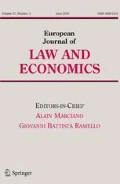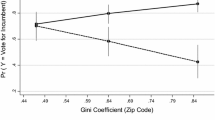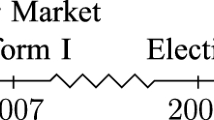Abstract
This paper empirically evaluates two competing theories of electoral accountability in the context of New Orleans’ 2006 mayoral election. According to the democratic efficiency theory, voters can successfully punish ineffective political agents by removing them from office. In contrast, the public choice theory argues that the bundled nature of political goods prevents voters from successfully holding ineffective politicians accountable. We find that although there is limited support for the punishment effect predicted by the democratic efficiency theory, this effect is overwhelmed by the fact that the bundle of goods politicians offer contains elements that pull in opposing directions. This prevents the punishment effect from having any real impact, leading to democratic failure. Our results support the public choice theory of electoral (un)accountability.






Similar content being viewed by others
Notes
The political bundling problem remains regardless of candidates’ absolute levels of competence. For example, even if all candidates in a given New Orleans mayoral election are largely incompetent, as long as they aren’t identically so, citizens still face a tradeoff between a candidate’s relative competence and the other elements of the political bundle he offers.
To our knowledge this paper is the second to use a hurricane-caused disaster in New Orleans to evaluate the determinants of its mayoral election. The first is Abney and Hill (1966), who consider natural disaster in New Orleans as a political variable.
Nor can Nagin be blamed for the failure to devote the resources required to make the levies that failed in the face of Hurricane Katrina strong enough to withstand a Category 5 hurricane when those levies were being built and later attended to. That fault lies largely at the feet of American taxpayers.
One key purpose of representative democracy is to give citizens a means of expressing their evaluations of politicians’ performance. Our purpose in this paper is to test whether democracy does in fact faithfully reflect the various elements of citizens’ evaluations of that performance (per the democratic efficiency hypothesis) or whether it might fail to do so because of political “bundling” (per the public choice hypothesis).
We exclude the remaining eight precincts because of missing data. These are in Ward 9, precincts 41A, 41B, 41C, 41D, 42C, 44G, 44O, 45A.
We exclude absentee ballots not assigned to a precinct.
The only other major candidate facing Nagin and Landrieu in the general election was Audubon Nature Institute CEO Ron Forman who garnered 17% of the vote.
Our simulation of column 4 evaluates change in percent black at its mean, −1.94.
The average employed in our regressions is based on a sample of three observations within each precinct. The standard deviation and range was calculated from these three observations.
References
Abney, F. G., & Hill, L. B. (1966). Natural disasters as a political variable: The effect of a hurricane on an urban election. American Political Science Review, 60, 974–981.
Brinkley, D. G. (2006). The great deluge: Hurricane Katrina, New Orleans, and the Mississippi Gulf Coast. New York: Harper Collins Publishers.
Buchanan, J. M., & Tullock, G. (1962). The calculus of consent: Logical foundations of constitutional democracy. Ann Arbor: University of Michigan Press.
Eichel, L. (2005). What went wrong, knight ridder special report, 11 Sept 2005.
Garrett, T. A., & Sobel, R. S. (2003). The political economy of FEMA disaster payments. Economic Inquiry, 41, 496–509.
Krueger, A. (2005). At FEMA, disasters and politics go hand in hand, New York Times, 15 Sept 2005.
Leeson, P. T., & Sobel, R. S. (2008). Weathering corruption. Journal of Law and Economics, 51, 667–681.
McKelvey, R. D. (1976). Intransitivities in multidimensional voting models and some implications for agenda control. Journal of Economic Theory, 12, 472–482.
Myers, L., & The NBC Investigative Unit. (2005). Relief chaos in Katrina’s wake, MSNBC.com, 8 Sept 2005.
Phillips, S. (2005). What went wrong in hurricane crisis, interview transcript, Dateline NBC, 9 Sept 2005.
Romer, T., & Rosenthal, H. (1978). Political resource allocation, controlled agendas, and the status quo. Public Choice, 33, 27–43.
Seed, R. B., & The Independent Levee Investigation Team. (2006). Investigation of the performance of the New Orleans flood protection systems in Hurricane Katrina on 29 Aug 2005. Available at: http://www.ce.berkeley.edu/~new_orleans/.
Shughart, W. F., I. I. (2006). Katrinanomics: The politics and economics of disaster relief. Public Choice, 127, 31–53.
Sobel, R. S., & Leeson, P. T. (2006). Government’s response to Hurricane Katrina: A public choice analysis. Public Choice, 127, 55–73.
Sobel, R. S., & Leeson, P. T. (2007). The use of knowledge in natural disaster relief management. Independent Review, 11, 519–532.
Wittman, D. A. (1989). Why democracies produce efficient results. Journal of Political Economy, 97, 1395–1424.
Wittman, D. A. (1995). The myth of democratic failure: Why political institutions are efficient. Chicago: University of Chicago Press.
Acknowledgments
We thank Michael Munger and an anonymous reviewer for helpful comments on an earlier version of this paper. Andrea Dean, Andrew Kashdan, and Jennifer Dirmeyer provided excellent research assistance. The financial support of the Mercatus Center is also gratefully acknowledged.
Author information
Authors and Affiliations
Corresponding author
Rights and permissions
About this article
Cite this article
Leeson, P.T., Sobel, R.S. Race, politics, and punishment. Eur J Law Econ 31, 265–285 (2011). https://doi.org/10.1007/s10657-011-9228-9
Published:
Issue Date:
DOI: https://doi.org/10.1007/s10657-011-9228-9




